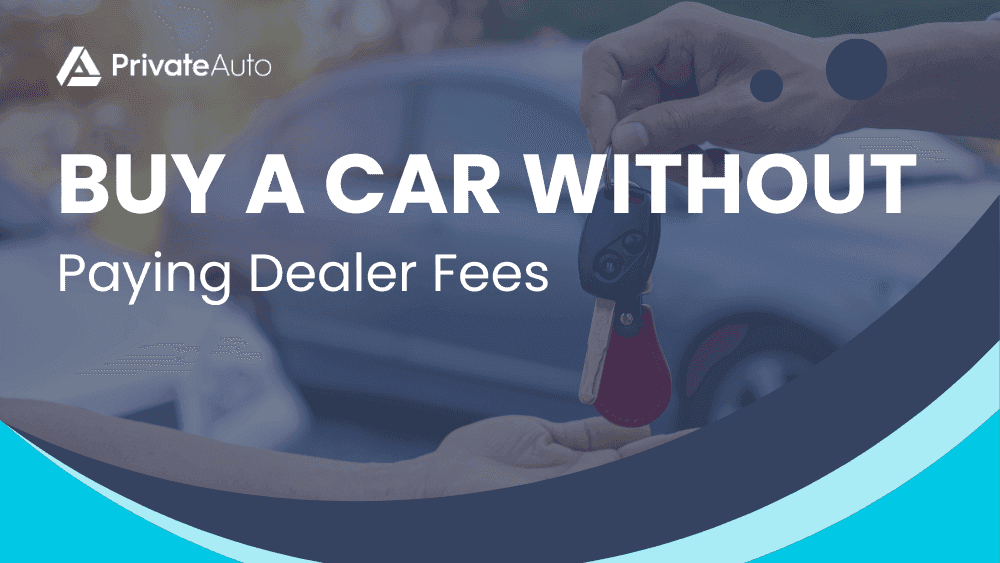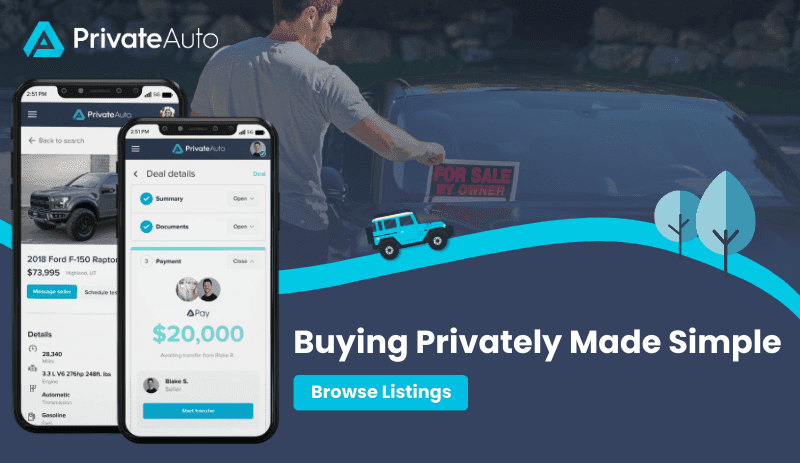How to Buy a Car Without Paying Dealer Fees?
To buy a car without paying dealer fees, don't go to a dealer. Buy from a private seller and get way more car for your cash.
Traditionally, a private-party car transaction has come with a fair bit of hassle, which is why many consumers have preferred to go to a dealership. Good news: we're making private car transactions safe, convenient, easy, and fast.
We've built a self-service platform that gives you the power to get the deal done, from first contact with the seller through paying for the car. To experience the awesomeness, shop private-party used cars for sale and prepare to be amazed.
We've built a self-service platform that gives you the power to get the deal done, from first contact with the seller through paying for the car. To experience the awesomeness, shop private-party used cars for sale and prepare to be amazed.
Why is it Better to Buy From a Private Seller?
Here are the advantages of skipping the dealership and buying from a private party:
We do admit that dealers bring a certain amount of convenience that you don’t traditionally get when you buy from a private seller. That’s why we exist. PrivateAuto gives you dealer-like convenience in the palm of your hand.
•
Avoid extra fees. Dealerships charge documentation fees that range from $50 to over $1,000.
•
Get a better price. The dealership business model depends on buying low and selling high to generate a profit and keep the lights on. Cut out the middleman and get a better deal.
•
You have access to a wider pool of potential sellers if you buy privately. More cars to choose from, at better prices.
•
You drive the deal on your terms: PrivateAuto allows you to make offers and negotiate the best deal directly with the seller.
•
In some states, buying from a private seller means no sales tax. For example, Hawaii and Nevada charge sales tax on retail (dealership) car purchases, but not on private-party ones.
We do admit that dealers bring a certain amount of convenience that you don’t traditionally get when you buy from a private seller. That’s why we exist. PrivateAuto gives you dealer-like convenience in the palm of your hand.
Where is the Best Place to Buy a Car Privately?
There are tons of platforms for buying used cars online these days. Most serve as “meetingplaces” but lack transactional capabilities. They help you find a car to buy, but that’s about it. You and the seller are left to muddle through how to meet up, how to handle paperwork, and how to handle payment.
PrivateAuto is the only transactional marketplace that takes you through every aspect of the deal. Here are some of the benefits:
Found your dream car on Facebook Marketplace, Craigslist, or eBay Motors? DealNow lets you start a deal on another site and instantly transact anytime. Invite the seller to DealNow via a custom link you'll create, and then enjoy a fast-track deal flow and proprietary infrastructure.
Start your transaction anywhere, finish it with DealNow
PrivateAuto is the only transactional marketplace that takes you through every aspect of the deal. Here are some of the benefits:
•
Instant, fee-free, and secure payments via PrivateAuto Pay. Send up to $1M in the blink of an eye.
•
In-app messaging keeps your contact info private.
•
Test drive scheduling feature eliminates back-and-forth with the seller
•
In-app electronic signing of the bill of sale protects you and gives you a legal record
Found your dream car on Facebook Marketplace, Craigslist, or eBay Motors? DealNow lets you start a deal on another site and instantly transact anytime. Invite the seller to DealNow via a custom link you'll create, and then enjoy a fast-track deal flow and proprietary infrastructure.
Start your transaction anywhere, finish it with DealNow
What Fees Can't Be Avoided?
While specifics vary from state to state, there are certain taxes and fees you'll owe regardless of whether you buy from a dealership or a private seller. Here’s what buyers commonly pay:
1. Title transfer fee.
2. Vehicle registration fee.
3. License plate fee (unless you're in California or Minnesota). Some states include the cost of license plates in the registration fee, while others charge it separately.
4. State vehicle sales tax (unless you live in a tax-free state).
5. Local sales taxes, depending on your state, city, and county.
1. Title transfer fee.
2. Vehicle registration fee.
3. License plate fee (unless you're in California or Minnesota). Some states include the cost of license plates in the registration fee, while others charge it separately.
4. State vehicle sales tax (unless you live in a tax-free state).
5. Local sales taxes, depending on your state, city, and county.
How Do I Avoid Fraud When Buying a Car Privately?
Unfortunately, criminals use a variety of methods to trick car buyers, such as fake vehicle histories, odometer tampering, or title scams.
PrivateAuto offers vehicle history reports with all premium listings and also has identity verification. These measures cut down significantly on fraudsters, but it always pays to be vigilant.
Don't let a seller rush you into accepting a high price or paying without verifying the details and test driving. If a seller gives you a high-pressure "act now or lose out" ultimatum, it's best to walk away. If the car is priced fairly, there will be other listings available without undue seller pressure.
The key is taking your time—carefully inspecting the car, verifying the VIN, test driving carefully, and not paying until you're confident about going through with the transaction.
PrivateAuto helps by letting you schedule test drives securely and make payments only when terms are met. With a little patience, you can find the right car without being rushed into a fraudulent deal.
PrivateAuto offers vehicle history reports with all premium listings and also has identity verification. These measures cut down significantly on fraudsters, but it always pays to be vigilant.
Don't let a seller rush you into accepting a high price or paying without verifying the details and test driving. If a seller gives you a high-pressure "act now or lose out" ultimatum, it's best to walk away. If the car is priced fairly, there will be other listings available without undue seller pressure.
The key is taking your time—carefully inspecting the car, verifying the VIN, test driving carefully, and not paying until you're confident about going through with the transaction.
PrivateAuto helps by letting you schedule test drives securely and make payments only when terms are met. With a little patience, you can find the right car without being rushed into a fraudulent deal.
How to Buy a Car With PrivateAuto
You’ll love how smooth and secure the car-buying process is when you use the PrivateAuto mobile app.
1. Browse used cars for sale by owner. Filter by location, vehicle type, or other criteria.
2. Make offers on vehicles you like (PrivateAuto lets you offer less than the asking price).
3. Message the seller with any questions without giving your contact info.
4. Schedule the test drive while keeping your personal details private.
5. Electronically sign the bill of sale along with the seller.
6. Instantly send payment and take ownership of the car when the seller signs the title and gives you the keys.
1. Browse used cars for sale by owner. Filter by location, vehicle type, or other criteria.
2. Make offers on vehicles you like (PrivateAuto lets you offer less than the asking price).
3. Message the seller with any questions without giving your contact info.
4. Schedule the test drive while keeping your personal details private.
5. Electronically sign the bill of sale along with the seller.
6. Instantly send payment and take ownership of the car when the seller signs the title and gives you the keys.
Car Buying FAQ
What paperwork is needed to buy a car from a private seller?
Before you buy the car make sure that you have all the mandatory paperwork for your state. If you are unsure of which documents you need, contact your local DMV office for more info.
Here are some common documents that are typically needed:
- Bill of sale
- Vehicle title
- Registration
- Release of liability
- Odometer statement
- Proof of auto insurance
- State ID
- Inspection forms
Here are some common documents that are typically needed:
- Bill of sale
- Vehicle title
- Registration
- Release of liability
- Odometer statement
- Proof of auto insurance
- State ID
- Inspection forms
What is the safest way to transfer money when buying a vehicle privately?
Do I need an escrow service when buying a car privately?
Popular Vehicles For Sale By Owner

Caleb Whittle
Contributing Author
Caleb Whittle is the Chief Marketing Officer at PrivateAuto. He's based in Utah and has had a passion for education and learning throughout his life. Helping others understand the nuances of buying & selling cars has become his mission through content creation and writing. His current dream car is a Tesla Model S Plaid.


